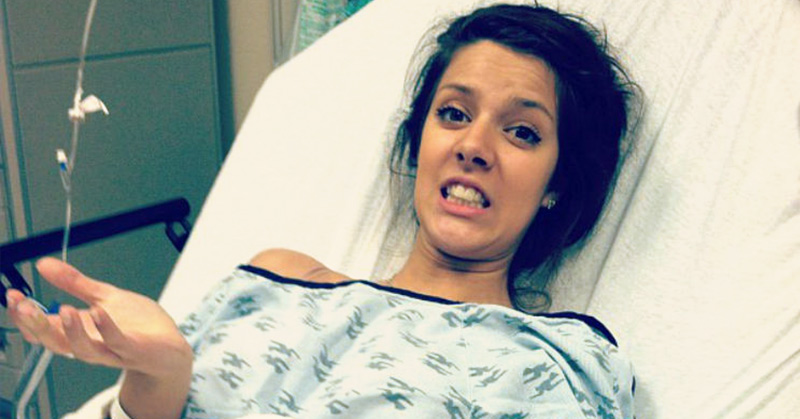Katherine made plans to spend a special spring break with her two-daughters at Disney World while leaving her husband and 5-month old at home. Little did Katherine know, she was in for the ride of her lifetime.
On the second day of her trip with her daughters, the family had lunch in a cafe on a faux Mexican street. Katherine told the waiter that it was one her daughter’s fourth birthday which made their evening even more magical, with songs and sweets.
Little did Katherine know, that this special night was about to trigger her into feeling bad, “like really bad”.
Thinking she was suffering from one too many fajitas and sweets, once Katherine and her girls made it back to her hotel suite, she was curled up on her side with unbearable stomach cramps.
The following day, things got worse. She was excited to experience Disney with her daughters, but after a night of severe food poisoning-like symptoms, combined with a terrible sleep, Katherine was now also experiencing a localized pain on her lower right side.
After looking up her symptoms on WebMD, she self-diagnosed. “Just my luck,” she said “Appendicitis in the happiest place on earth”.
Katherine called urgent care as she sent her girls to the park with her mom. “There’s only so long before kids will wait for you to either get better or die when they know they are just a couple feet outside the gilded gates of Disney World”. After her mom saved the day, Katherine worked with a man on the other end of the line, who started listing standard diagnostic questions.
He finally asked, “Is there any chance you’re pregnant?”.
“Oh no!” she explained. “I had my tubes tied five months ago when I had a C-section with my last child.”
Tubal ligation, defined by the Mayo Clinic, is the sterilization of the fallopian tubes. They either cut or permanently block the tubes to prevent pregnancy, calling this a ” type of permanent birth control.”
The man on the urgent care line settled on a diagnosis of constipation and also advised Katherine to seek in-person attention for her case. Katherine would have been happy with a “dose of Miralax” she said, “most moms would agree that deserting her family at the Magic Kingdom for a case of constipation, was not an option”.
After a couple of tums, Katherine started to feel a little better. As the urgent-care stranger reassured her that she’s “ probably not dying”, this gave her enough motivation to find her family and make it onto Space Mountain.
Their vacation ended early, Katherine was feeling bloated and uncomfortable, but at least the pain had subsided. Once she was finally home, she figured after a day of rest in her own bed, she’d be feeling back to normal.
Instead, the next morning she woke up at 7:30 am with intense pains. She made it halfway down the stairs when her husband took one look at her and drove her straight to the ER.
Katherine got there at 8 am and nurses and doctors began poking.
“Could you be pregnant?” They asked. She insisted “no, I couldn’t be, I had my tubes tied”.
“Do you still have your appendix?” She nodded yes and was assured it was likely a case of appendicitis, as they sent her in for a CAT scan for confirmation.
Katherine’s results came back reading abnormal and inconclusive. They needed to schedule an MRI next, but before that, the doctor said, “we just have to do one more test to make absolutely sure you’re not pregnant.”
In too much pain to protest, Katherine peed in a cup and waited for the MRI.
A wide-eyed doctor approached, “We always warn people that this may happen, but you’re the first person I’ve ever met that it happened to!”
“The pregnancy test came back positive. We think it’s an ectopic pregnancy.”
Roughly one in 50 pregnancies are ectopic, this occurs when a fertilized egg is implanted outside of the uterus, such as in a fallopian tube or in the abdominal cavity. Ectopic pregnancies may initially cause the same symptoms as a typical pregnancy, however as the fetus tries to develop outside of the uterus the necessary blood supply and support is not available, and ultimately an ectopic pregnancy can not develop into a healthy pregnancy or baby.
Symptoms of an ectopic pregnancy include vaginal bleeding or spotting, cramping or pain in the lower abdomen, or both. Some women will have no symptoms until the structure containing the ectopic pregnancy ruptures, which typically happens at 6 to 16 weeks.
In Katherine’s case, she began feeling the painful side effects of her ectopic pregnancy at Disney World, when she finally sought medical attention, her structure had ruptured indicating she was between 6-16 weeks. She began losing blood at a rapid rate and her need for immediate surgery erased any fear that she had about the procedure itself.
Katherine woke up a few hours later with tiny scars of laparoscopic surgery on her abdomen and they sent her home after just a few hours. She was left feeling “battered and anemic, but more or less – fixed.”
Getting your tubes tied isn’t a 100 percent guaranteed form of birth control – according to the American Pregnancy Association. Rates of pregnancy are around 1/1,000 in the first year after the procedure, and 2-10/1,000 after five years.
This story of ectopic pregnancy was a wild ride for Katherine, while she would have been thrilled with a fourth child, she now has a pretty interesting story of how she was surgically sterilized, but almost “bled out on Space Mountain due to an unexpected pregnancy, gone wrong”.
Sources
- True Story: I Got My Tubes Tied and Still Got Pregnant https://mom.me/lifestyle/69774-got-my-tubes-tied-still-got-pregnant/
- Will an Ectopic Pregnancy Still Give You Pregnancy Symptoms? https://mom.me/lifestyle/13429-will-ectopic-pregnancy-still-give-you-pregnancy-symptoms/
- Tubal ligation https://www.mayoclinic.org/tests-procedures/tubal-ligation/about/pac-20388360
- Signs of a Ruptured Ectopic Pregnancy https://www.verywellfamily.com/ruptured-ectopic-pregnancy-symptoms-and-signs-2371253

